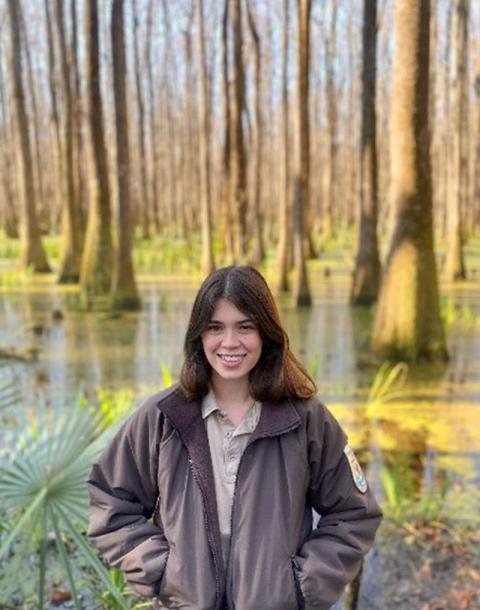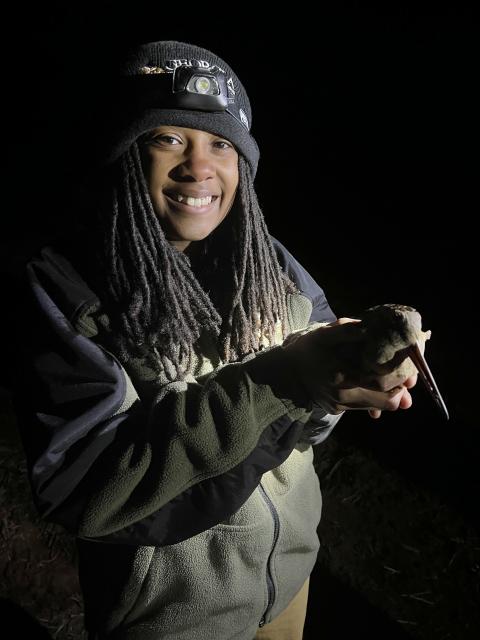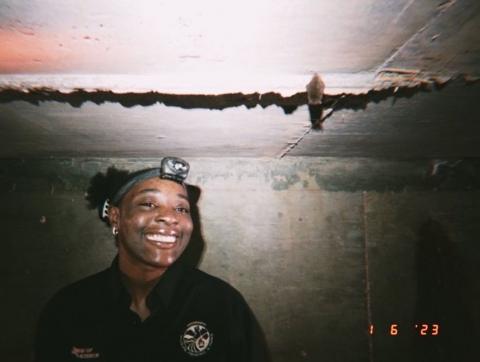Three recent recipients of the Minorities in Natural Resource Conservation Technical Committee’s (MINRC) scholarships to attend SEAFWA’s annual conference have joined the professional ranks with agencies in the southeast. Abby Florez is a Wildlife Refuge Specialist in Georgia, Lavendar Harris is also in Georgia as a Wildlife Biologist, and Cerise Mensah is an Environmental/Natural Resources Specialist in Mississippi.
MINRC’s mission is to increase the overall representation of minorities and women in professional occupations within the field of natural resource conservation who are interested in employment with SEAFWA member agencies, federal partners, or other natural resource organizations. Additionally, MINRC provides best practice information to conservation professionals to cultivate a more welcoming environment for under-represented people. In support of these goals, MINRC provides sponsorships for select students to attend the annual SEAFWA conference. These fellows are then able to network with current professionals and learn more about professional opportunities.
Abby Florez credits her experiences with MINRC at the 2019 conference with providing her “a wider view of what a future in this field would look like.” Specifically, she recalls making connections with US Fish & Wildlife Service (USFWS) staff in attendance to help with that vision. In the summer of 2020, while an undergraduate at Mississippi State University (MSU), Abby was accepted into the federal government’s Pathways program as a Biological Technician intern at Wheeler National Wildlife Refuge. Upon graduation from MSU in 2021, she joined the permanent ranks of the USFWS as a Wildlife Refuge Specialist at the Savannah Coastal Refuge Complex in Savannah. Although just beginning her career, Abby has already been a part of complex community engagement projects, including coordination of deer hunting on the refuge, as she looks toward becoming a Refuge Manager someday. Experiences like associating with MINRC and SEAFWA “gave me more of a drive to establish a true career in my future” said Abby. She looks forward to continuing her involvement with MINRC in the future.
Lavendar Harris started her career with the Georgia Department of Natural Resources (GA DNR) as a Wildlife Biologist in January 2023. Her primary role is assisting species biologists on various research projects and contributing to studies monitoring turkeys, migratory birds, alligators, and small and large game furbearers. “Thanks to my experience at the 76th Annual SEAFWA conference as a MINRC student, I was able to network with various biologists and directors from GADNR and was offered this position!” said Lavendar. She was also the recipient of the 2022 Roosevelt Conservation Award focusing on various recruitment methods that could enable agencies to embrace diversity and inclusion by hiring scientists from different socioeconomic and geographic backgrounds. Utilizing these efforts can increase inclusion and retention in the conservation fields.
Cerise Mensah recently started her career as an Environmental/Natural Resources Specialist with the Mississippi Department of Wildlife, Fish, and Parks (MDWFP). A Georgia native, Cerise developed a passion for wildlife and conservation at an early age. After volunteering at Zoo Atlanta during her senior year of high school, she knew she wanted to pursue a career focused on wildlife, conservation, and endangered species. After meeting a recruiter from Mississippi State University at a college fair, she learned about the variety of undergraduate degree programs that involved all her environmental passions. Cerise majored in Wildlife, Fisheries, and Aquaculture with a concentration in Conservation Biology. After graduating, she spent the summer interning as a Biological Science Technician at the National Wildlife Research Center (NWRC), a unit within the U.S. Department of Agriculture (USDA) Animal and Plant Health Inspection Services (APHIS). Research at the center focused on the impacts of the Double-crested Cormorant on aquaculture farms to reduce their impact on catfish farm populations. Cerise’s duties as an Environmental/Natural Resources Specialist with the MDWFP include sampling various bat species in the southeastern region of Mississippi to test for white-nose syndrome. She will also work in other areas of the research department and the agency to gain knowledge and experience in conservation and natural resources.
The MINRC Committee is pleased to have helped these past scholars move from the conference to the field. They may be those agency representatives at a future MINRC event who help guide another minority to the conservation profession. Please join MINRC in welcoming and supporting these young professionals in conservation.


